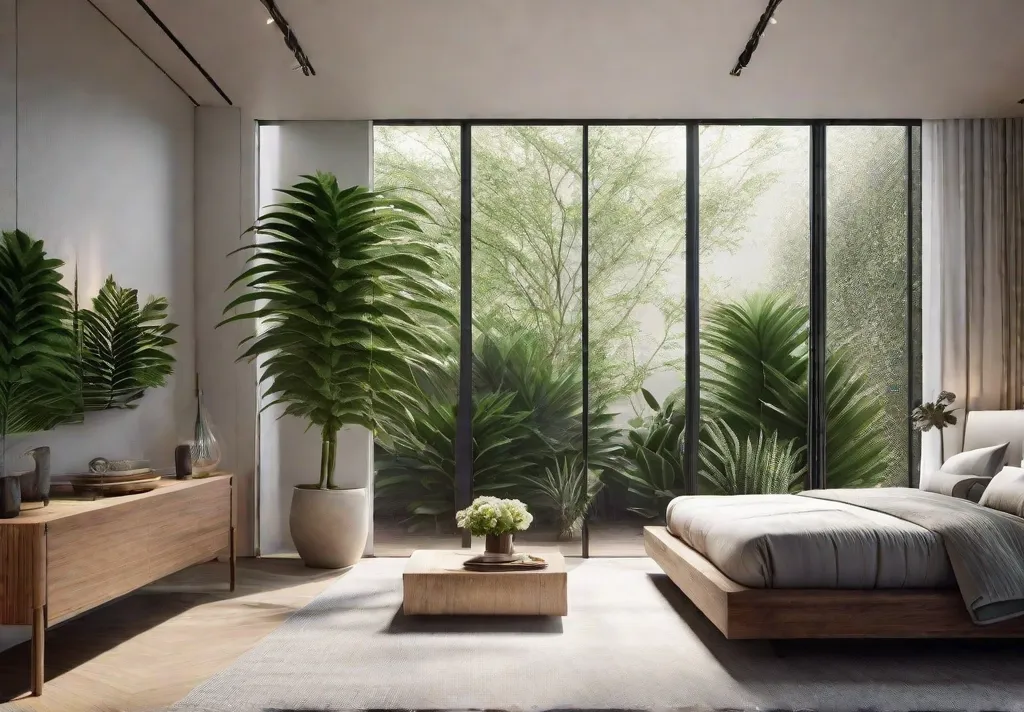Ourtoday'sms have become more than just a place to sleep in today's fast-paced world. They are our sanctuaries, our retreats where we can relax, recharge, and find solace. Minimalist bedroom design is a growing trend among homeowners seeking tranquility, simplicity, and elegance in their sleeping space.
This article will delve into ten unexpected ideas to bring a minimalist touch to your bedroom, inspiring you to transform it into a sanctuary. We explore unique concepts beyond the typical decluttering and color palette changes. Our goal is to educate and encourage you to create a minimalist bedroom that is both functional and aesthetically pleasing.
By embracing minimalist design principles, you can craft a space that promotes relaxation, improves sleep, and sparks creativity. Whether you're a minimalist enthusiast or simply seeking ways to simplify your bedroom, this article will provide valuable insights and practical tips to achieve the minimalist bedroom of your dreams.
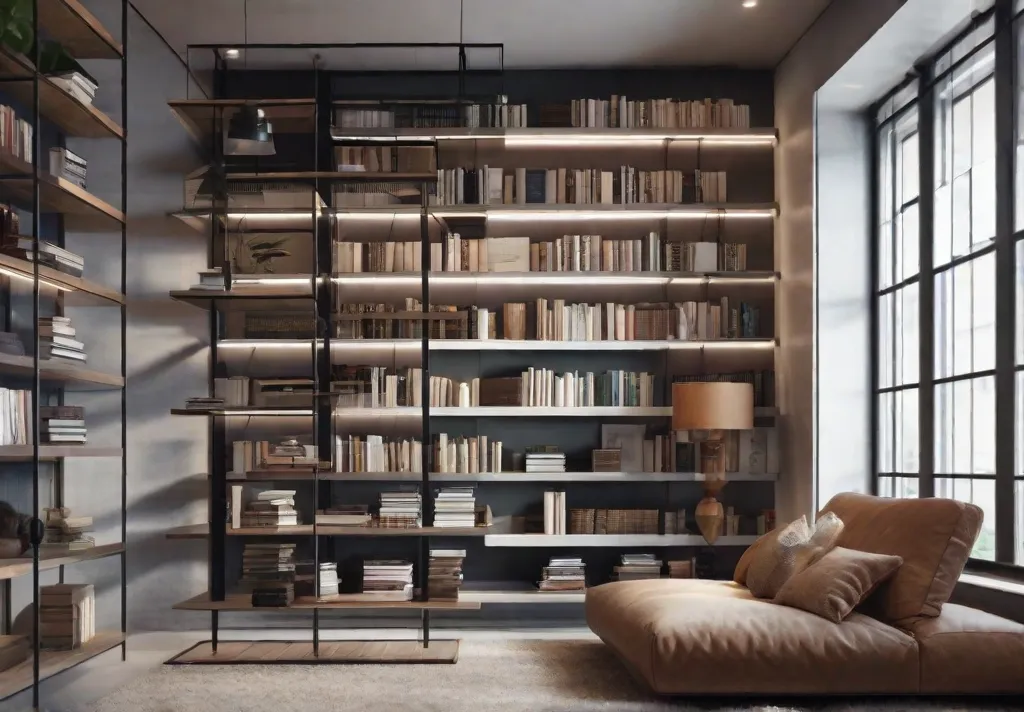
Principles of Minimalist Design
Before diving into the ten surprising ways to minimize your bedroom, let's review some critical principles of minimalist design:
Simplicity: Minimalist design emphasizes simplicity in form, color, and texture. It creates a sense of spaciousness and serenity by eliminating clutter and unnecessary ornamentation.
Functionality: Minimalist spaces are designed to be functional and efficient. Every piece of furniture and decor serves a specific purpose and contributes to the overall utility of the room.
Clutter-Free Environment: Minimalism promotes a clutter-free environment by reducing possessions and eliminating unnecessary items. This fosters a calm order, allowing inhabitants to focus on what is truly important.
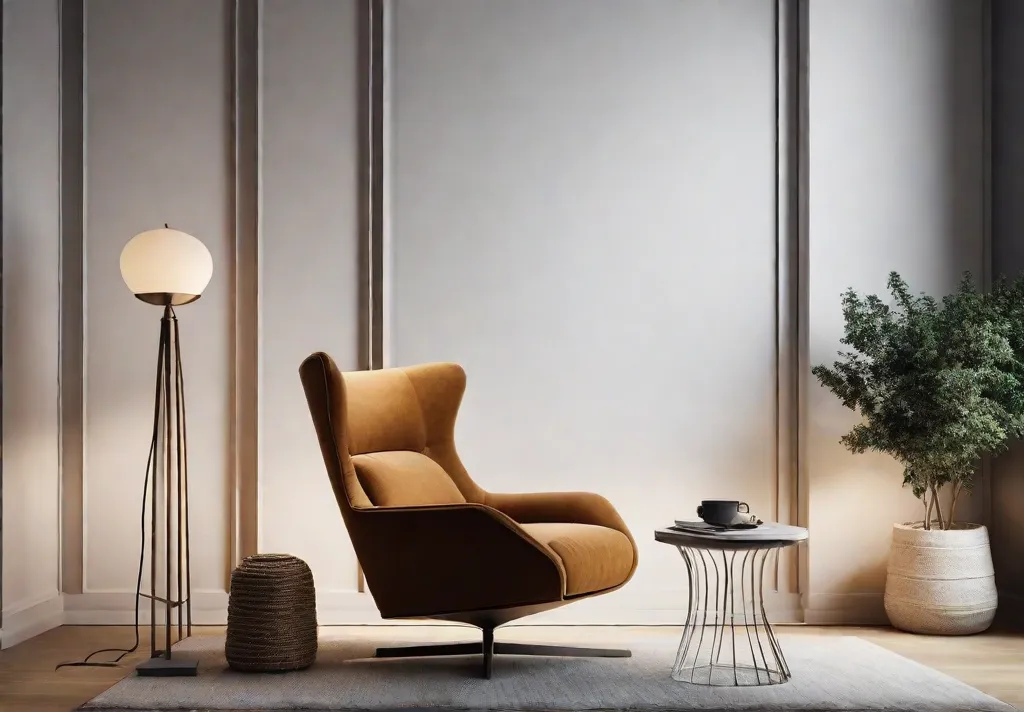
Innovative Storage Solutions
Storage is essential for a clutter-free minimalist bedroom. Here are some unexpected storage solutions to maximize space while minimizing visual chaos:
Hidden Storage
Out of sight is out of mind. Tuck storage compartments away to keep surfaces clear.
- Under-bed storage: Utilize under-bed space with slim, rolling storage containers. These can secretly hold off-season clothes, extra bedding, or rarely used items.
- Built-in closets: Opt for built-in wardrobes with sliding doors to maximize space and minimize visual clutter. Include adjustable shelves, hanging rods, and drawers for efficient organization.
- Multi-functional furniture: Invest in furniture pieces that double as storage solutions. Ottomans with built-in storage, bed frames with drawers, and headboards with shelves can discretely organize items.
Vertical Space Utilization
Don't forget the vertical real estate in your bedroom!
- Shelving: Install floating shelves above the bed, desk, or dresser to display books, plants, and decor. Choose minimalist shelves with clean lines and neutral colors to maintain cohesion.
- Wall storage: Mount hooks, pegboards, or magnetic strips on walls to hang items like jewelry, keys, or hats. This keeps surfaces clear while adding functions.

Decluttering Tips
Decluttering is crucial for upholding a minimalist space.
- Periodic purges: Set aside time regularly to declutter your bedroom and remove unused or unneeded items. Donate or sell these pieces to keep your space clutter-free.
- One-in, one-out rule: Only bring in new items after removing an old piece. This helps maintain balance and prevents accumulation.
Organizational Accessories
Keep items tidy and in their place with these subtle organizers:
- Minimalist-designed organizers: Invest in boxes and canisters with simple forms and neutral colors. Clear containers allow you to see contents easily. Labeled ones keep things organized.
- Baskets and bins: Use baskets and containers to store bedding, pillows, and other items. Choose natural materials like wicker or seagrass for warmth.
Soothing Color Palette and Textures
A minimalist bedroom should evoke tranquility and serenity. The color palette plays a crucial role in cultivating this ambiance.
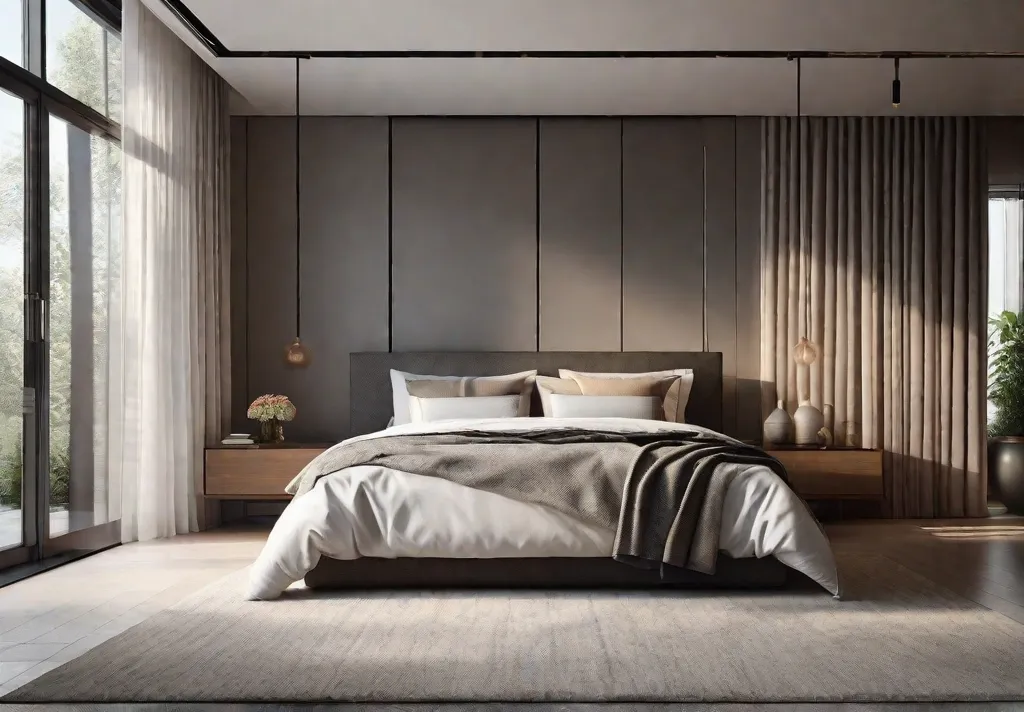
Soft, Neutral Colors
Opt for calming, neutral wall colors like white, cream, beige, light gray, and pale blue. These hues generate relaxation, which is ideal for restful sleep. Avoid bright, saturated colors that can disrupt peace.
Natural Materials
Introduce natural materials like linen, cotton, wool, and wood. These elements' inherent texture and coziness create warmth and depth while connecting to nature.
Sleek Lines & Smooth Surfaces
Choose furniture and decor with simple lines and smooth finishes to enhance the minimalist aesthetic. Avoid ornate or heavily detailed pieces that visually complicate the space. Smooth surfaces also simplify cleaning and maintenance.
Mindful Lighting
Lighting significantly impacts mood and ambiance. Here to illuminate your minimalist bedroom mindfully:
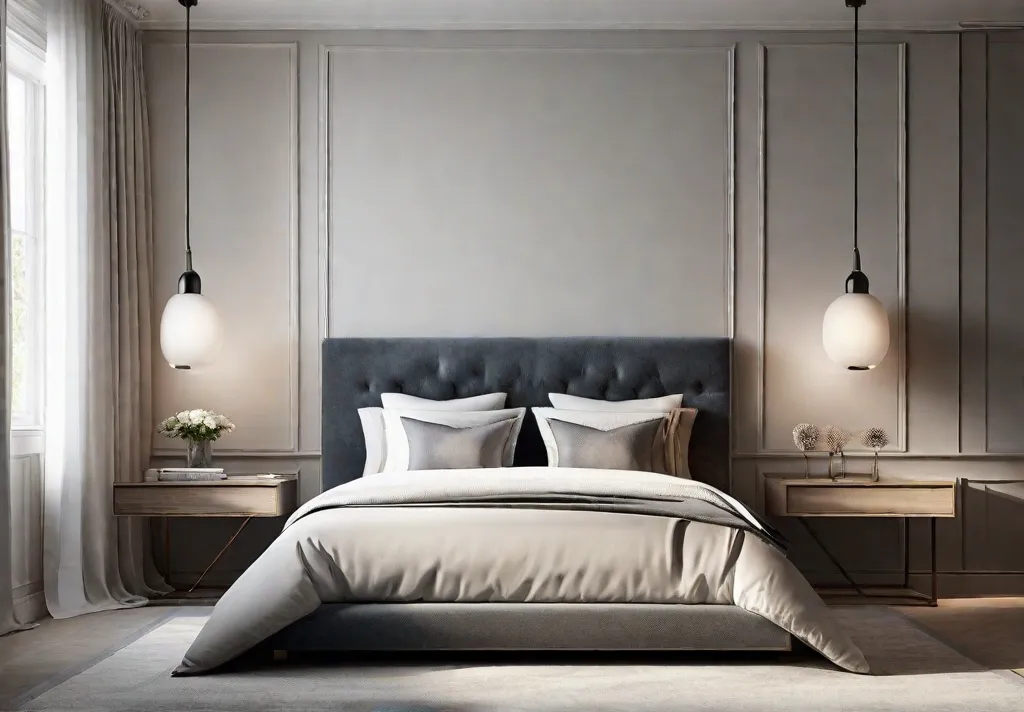
Maximize Natural Light
Harness sunlight's brightening and energizing power through positioning and windows.
- Place your bed near a window to wake gently to the morning light.
- Install sheer curtains to filter light during the day.
- Incorporate mirrors opposite windows to amplify sunlight.
Layer Lighting
Combine different lighting sources at various heights for flexibility.
- Use ambient lighting for overall illumination.
- Add task lighting for focused activities.
- Include accent lighting to highlight specific architectural or decorative features.
Smart Lighting
Integrate smart bulbs or panels to customize your lighting. These allow you to:
- Program personalized settings for morning routines or bedtimes.
- Adjust color temperature and intensity to set the perfect mood.
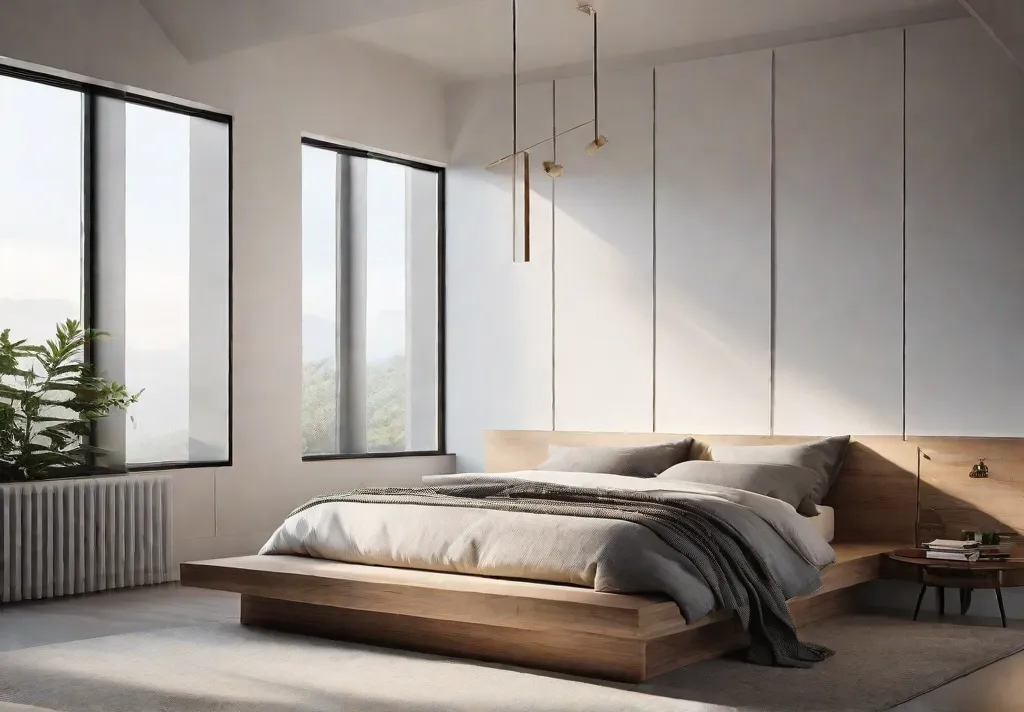
Essential Furniture Only
Furniture should contribute to function and remain visually minimal. Follow these guiding principles:
Simplicity is Key
Opt for furniture silhouettes with clean lines and neutral colors without excessive ornamentation. These seamlessly blend into a peaceful atmosphere.
Form Follows Function
Select pieces that solve problems or serve specific purposes. Avoid items included purely for decorative reasons. Multi-functional furniture maximizes efficiency.
Quality Over Quantity
Carefully choose a few high-quality, durable furniture items over many cheaper options. Timeless designs transcend fleeting trends.
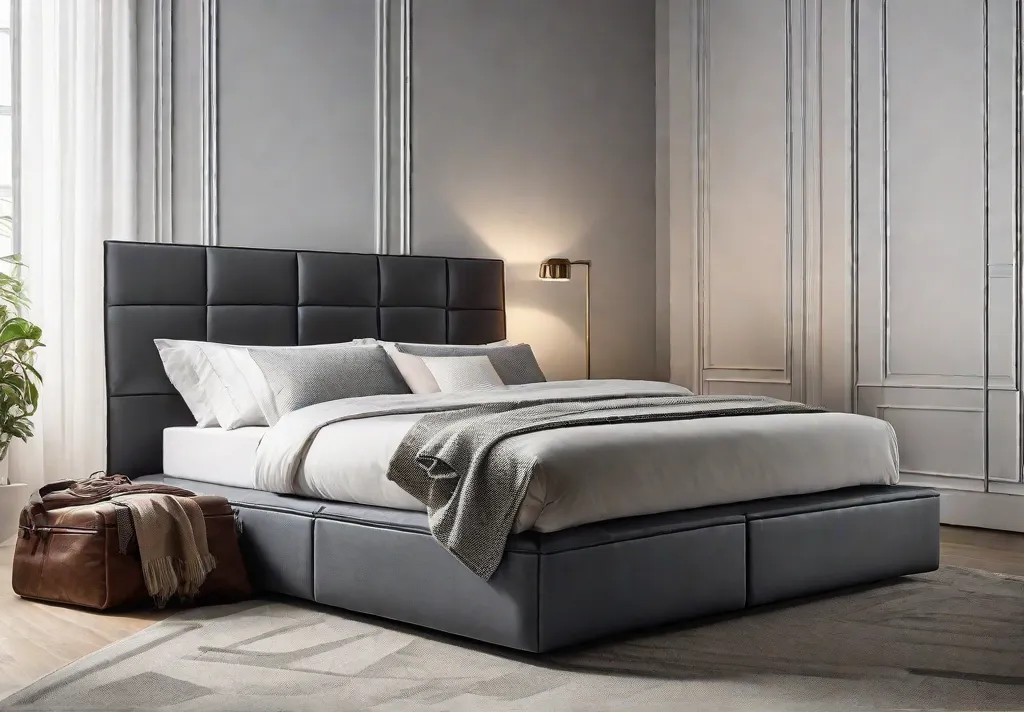
Space-Saving Solutions
When possible, invest in furniture that includes storage for added functionality. For example, a bench at the foot of the bed can double as a place to sit when putting on shoes and a spot to store extra blankets.
Creating a Minimalist Focal Point
While minimalism embraces simplicity, a bedroom needs a focal point for visual interest and balance. Here are two unexpected ways to achieve this subtly:
Textural Artwork
Instead of bold wall art, incorporate an intriguing textile piece. For example:
- Display a visually attractive throw blanket at the foot of the bed.
- Mount a handwoven wall hanging above the headboard.
- Place a sculptural fabric pendant lamp in the corner.
These pieces' texture and muted color add depth without overwhelming the space.
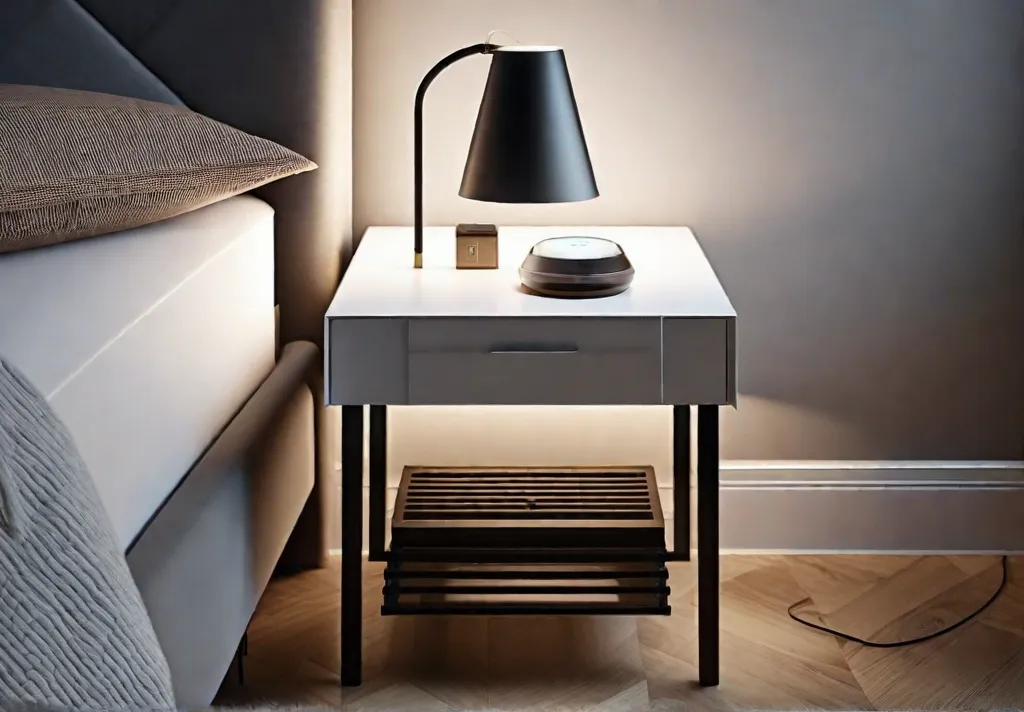
Unexpected Greenery
Plants instantly infuse spaces with life and freshness. For an unexpected twist:
- Suspend air plants in hanging glass terrariums above the nightstands.
- Display a living wall of low-light foliage on a blank wall space.
- Place a potted fern on an unexpected surface, like a stack of coffee table books.
Adopt a Minimalist Mindset
While aesthetic touches minimize visual clutter, adopting a minimalist mindset sustains it long-term by changing thought patterns.
Mindful Purchasing
Critically evaluate whether new items align with function and aesthetics before bringing them home. Consider their long-term impact on sustainability.
Quality Over Quantity
Cherish possessions purposefully chosen for their beauty, utility, and durability. Savor the satisfaction of owning lasting quality over trendy excess.
The Joy of Less
Appreciate the psychological benefits of a minimalist environment, like reduced stress and improved sleep. Revel in the calming sense of order and peace.
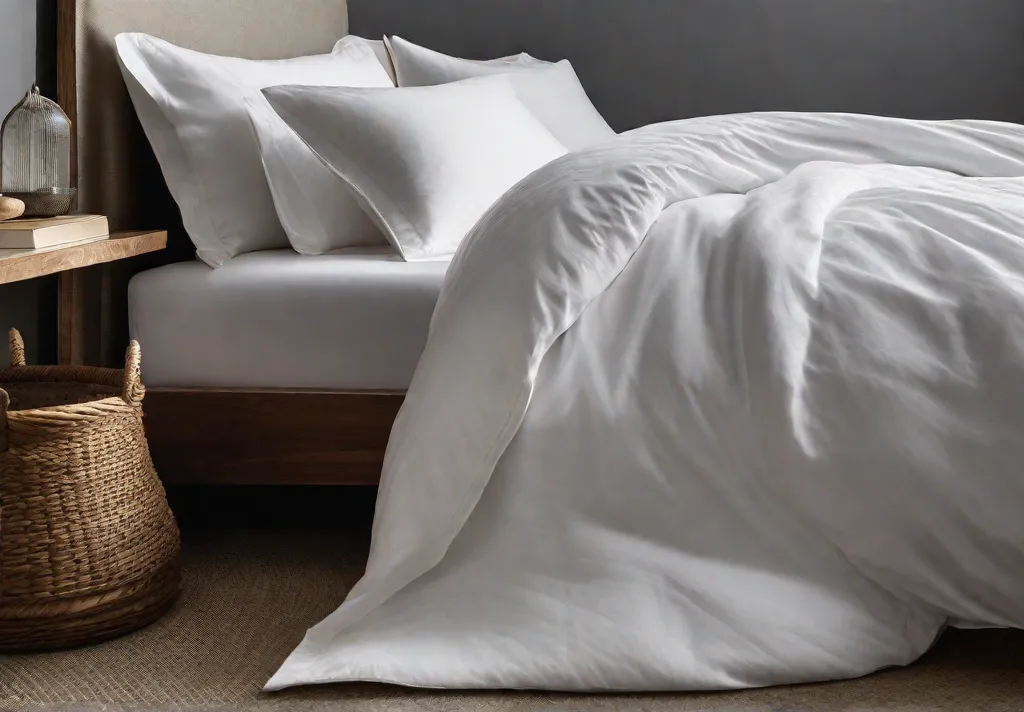
Maintaining Minimalism
Uphold the minimalist vision for your bedroom through regular maintenance. Proactively declutter, clean, and organize to prevent entropy.
Conclusion
Creating a minimalist bedroom that promotes tranquility involves more than just decluttering and choosing a neutral color scheme. This article revealed ten unexpected ideas to bring a subtle yet impactful minimalist touch to your space.
The innovative storage solutions, soothing textures, unexpected focal points, and mindset shifts covered transform bedrooms into sanctuaries of simplicity. Each element contributes to a clutter-free, cohesive environment where inhabitants can relax, recharge, and focus.
Embark on your journey to minimalist bedroom bliss using the tips and guiding principles above. Discover the transformative power of simplicity. Remember, adopting minimalism is a gradual process requiring commitment and maintenance. Begin by decluttering and organizing, then slowly incorporate the aesthetic touches over time.
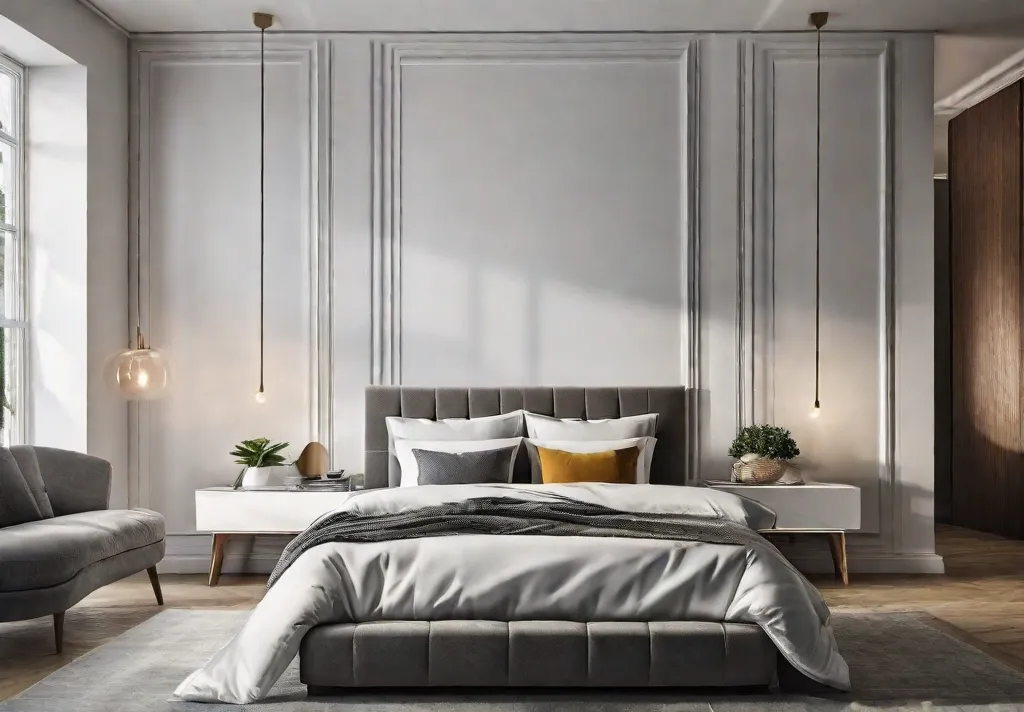
We'd love to see photos of your minimalist bedroom transformations in the comments below! Let's inspire each other to cultivate peaceful personal spaces that reflect our true priorities and bring us joy.
Frequently Asked Questions
Q: How do I declutter my existing bedroom to achieve a minimalist design?
A: Start by removing everything from your bedroom that doesn't serve a functional purpose or spark joy. Be ruthless. Donate, sell, or recycle unneeded items. Use the "one-in, one-out rule" for any new acquisitions. Establish a regular maintenance routine involving decluttering, cleaning, and organizing to prevent buildup.
Q: What are the best neutral wall colors for a minimalist bedroom?
A: Soft white, light gray, warm taupe, and pale blue make excellent minimalist wall color choices. Avoid bright or saturated hues. Neutral colors recede visually to make small spaces appear more prominent and cohesive.
Q: Should I eliminate all patterns and textures in my minimalist bedroom?
A: Not necessarily. While you want to avoid visually busy patterns, incorporate natural textures in moderation from wood, cotton, wool, and linen for warmth. Use simple stripes or subtle organic patterns sparingly in textiles. The key is keeping it simple and cohesive.
Q: What type of lighting works best in a minimalist bedroom?
A: Opt for sufficient ambient lighting to illuminate the whole space, supplemented with adjustable task lighting and intelligent bulbs/panels. Layer lighting at various heights for flexibility. Incorporate natural light whenever possible. The ability to control lighting intensity and color temperature helps create the perfect peaceful mood.
